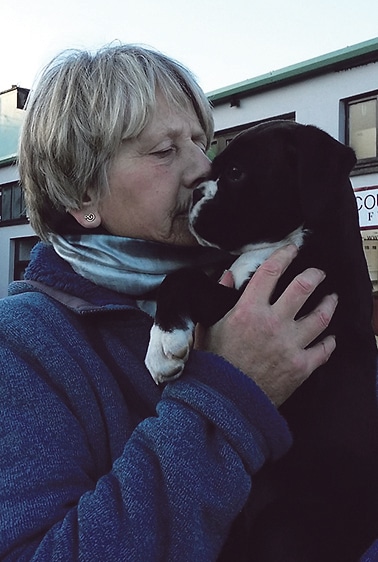
Liz Mahony is an experienced Dog Trainer and Holistic Therapist for all animals. In her monthly column, Liz aims to promote mutual respect between carer and dog. Contact Liz at
corkdogtrainingclasses.com
Just occasionally, I get a call from an owner and before I’m told the nature of the problem, he/she gives a sheepish laugh saying ‘I know I’m the reason my dog is doing what he does and it’s me that needs the training’! I join in the laughter and answer reassuringly that it could just be mixed messages.
But, in reality, I’m delighted with this comment because it generally means that the person understands that sorting out a dog’s behavioural problem more than likely means a change in the owner’s ways before anything can happen. That means the owner is already receptive to making those necessary changes in a genuine bid to improve life for both of them.
There’s no such thing as a ‘quick fix’ or a ‘magic wand’ in dog training but it’s depressing when I visit someone who believes that I can produce a result without the owner making changes. In most of those cases I’ve found that a dog doesn’t comply with any effort to train him because he knows that his owner isn’t going to change his ways. So, in effect, why should he?
I work on the philosophy that respect is a two-way street in any relationship whether between two humans or inter-species. A lack of respect on one side or the other means there’s an imbalance in that relationship and it won’t work long-term.
All of us are sentient beings. In other words, we all have the same emotions but we, humans, give direction to our canine companions while respecting their feelings.
Showing consideration for those emotions doesn’t mean that we are a pushover for our dogs. Rather I believe we can work to train and understand them from a position of strength.
For example, if I see that my dog is fearful of other dogs, I don’t pander to that fear. Instead I feel it’s important for me to recognise his fear and then give him another, more positive, way of regarding other dogs. So I won’t try to force him to ‘meet and greet’ them, but nor will I avoid them. I will give him a chance to view other dogs from a distance. I keep him far enough away that he can cope so that he doesn’t feel the need to bark, growl, lunge or use any other negative behaviour to hopefully make the dogs disappear.
If he can view them in a relaxed manner, his brain begins to work again and he can then notice that I’m not bothered by them. Hopefully he will take his queue from me especially if he has learnt to trust my judgement in other things. I might try to offer him a treat as a reward for standing or sitting quietly. The simple act of taking a treat
– or not – tells me how he feels. If he eats it as normal, he’s quite relaxed. Gulping it down means he’s slightly aroused and I probably need to move him back a little
further. Spitting out or ignoring the treat means he’s reaching his threshold when he will feel the need to react. If that’s the case, then I will take him back a good deal further until he can stand, sit quietly or even lie down. That means he’s in a comfortable space. I might then very gently praise him for doing so well and simply stay put.
He can relax because he knows that I’m listening to his signals. In this case, he’s telling me he’s afraid. It doesn’t matter whether I think his fear is groundless. The important point is that I’m listening to him and giving positive direction.
If you think about it, we, humans, like our doubts, fears or worries to be acknowledged and not just laughed at or dismissed. It would, therefore, make sense to acknowledge whatever is bothering our dogs and lead by example.
Each dog is different and will obviously react in a particular manner. Some years ago I had a very laid back Boxer who trusted me implicitly which made life easy for me.
Saffron, my present Boxer, is the excitable type which is teaching me to be very quiet, grounded and patient when she overreacts to a given situation. Getting over-excited myself only results in her becoming completely OTT. But, quietly calling her to return to and focus on me works wonders.
This has meant me having to change my ways and to recognise the extent of the particular emotions she’s displaying in any given context rather than expecting her to do my bidding no matter what. And that’s what I mean about an owner changing his ways to help his dog adapt to a new and better behaviour.


